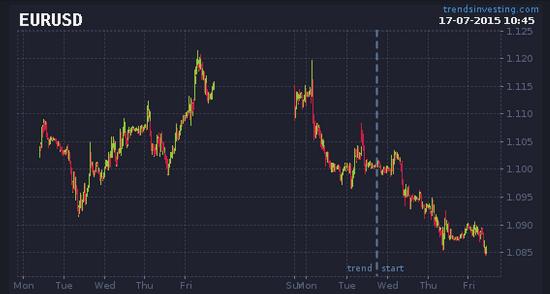Was Greece Debt Crisis Always Part Of Eurozone Master Plan?
Politics / Euro-Zone Jul 20, 2015 - 06:59 AM GMTBy: John_Rubino
 Since its inception, critics of the eurozone have been pointing to its incomplete nature — everyone uses the same money but keeps their own national budgets and tax regimes — and speculating that this “fatal flaw” would doom the system. Other observers, however, gave the euro’s creators more (Machiavellian) credit and assumed the initial version was simply what was politically attainable at the time. Future leaders, they predicted, would wait for (or engineer) a crisis and then use it to bully their reluctant citizens into a centralized government.
Since its inception, critics of the eurozone have been pointing to its incomplete nature — everyone uses the same money but keeps their own national budgets and tax regimes — and speculating that this “fatal flaw” would doom the system. Other observers, however, gave the euro’s creators more (Machiavellian) credit and assumed the initial version was simply what was politically attainable at the time. Future leaders, they predicted, would wait for (or engineer) a crisis and then use it to bully their reluctant citizens into a centralized government.
This month the crisis erupted, with Greece closing its banks, imposing capital controls and briefly defaulting on its debt before finally giving up. And now come the calls for centralization:
France’s Hollande Proposes Creation of Euro-Zone Government
(Bloomberg) – French President Francois Hollande said that the 19 countries using the euro need their own government complete with a budget and parliament to cooperate better and overcome the Greek crisis.“Circumstances are leading us to accelerate,” Hollande said in an opinion piece published by the Journal du Dimanche on Sunday. “What threatens us is not too much Europe, but a lack of it.”
While the euro zone has a common currency, fiscal and economic policies remain mostly in the hands of each member state. European Central Bank President Mario Draghi made a plea this week for deeper cooperation between the euro members after political squabbles over Greece almost led to a rupture in the single currency.
Countries in favor of more integration should move ahead, forming an “avant-garde,” Hollande said.
“Europe has let its institutions weaken and the 28 European Union member countries are struggling to agree to move ahead,” Hollande said on Sunday in a text which was also a homage to his mentor Jacques Delors, a former European Commission President who proposed similar ideas.
Draghi called for the creation of a shared treasury within 10 years in a joint proposal with politicians including European Commission President Jean-Claude Juncker and Eurogroup President Jeroen Dijsselbloem last month.
If you assume that the plan all along was to engineer a crisis and use it to force integration, then the behavior of the Troika begins to make sense. Instead of resolving the first Greek crisis in 2011, they papered it over and used the resulting breathing room to move Greece’s debt off the balance sheets of the European commercial banks that would have been fatally wounded by a Greek default. Then, once the system was sufficiently insulated from Greek damage, they told Athens to go ahead and leave, knowing that whatever happened next would be non-fatal to the currency union but scary enough to make full integration palatable for a critical mass of Spaniards, French and Italians. Hollande’s trial balloon is designed to test this thesis.
Lots of problems remain, of course, mostly involving the differences between the big and little players. For, say, Portugal or Greece, a “shared treasury” basically means becoming German subjects and living according to the latter’s rules, which sends obvious shivers down many spines. For Germany and the one or two other dominant players, running such a central government means being fully responsible for the behavior of Italians, which they would obviously like to avoid.
Most scary of all for the Germans, an integrated Europe, with its aging population, massive levels of government spending and rapidly accumulating debt would need a weak currency to avoid stagnation. So either way — a continuation of euro 1.0 or the adoption of euro 2.0 — inflation at higher rates than Germany expects will be unavoidable. Based on their reaction to the Greek “resolution,” foreign exchange traders seem to be figuring this out.

Copyright 2015 © John Rubino - All Rights Reserved
Disclaimer: The above is a matter of opinion provided for general information purposes only and is not intended as investment advice. Information and analysis above are derived from sources and utilising methods believed to be reliable, but we cannot accept responsibility for any losses you may incur as a result of this analysis. Individuals should consult with their personal financial advisors.
© 2005-2022 http://www.MarketOracle.co.uk - The Market Oracle is a FREE Daily Financial Markets Analysis & Forecasting online publication.



